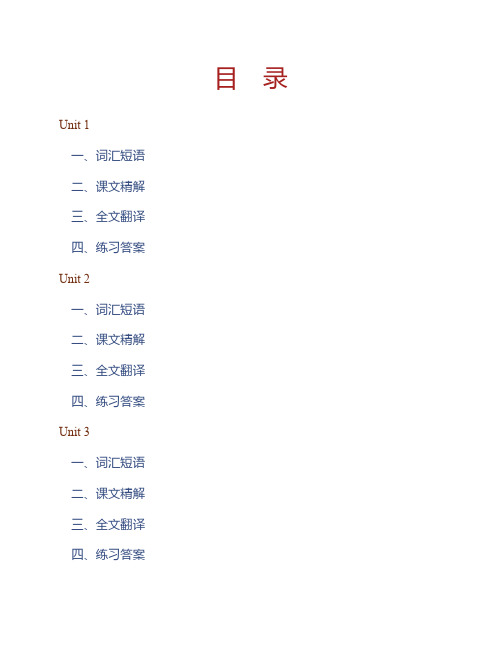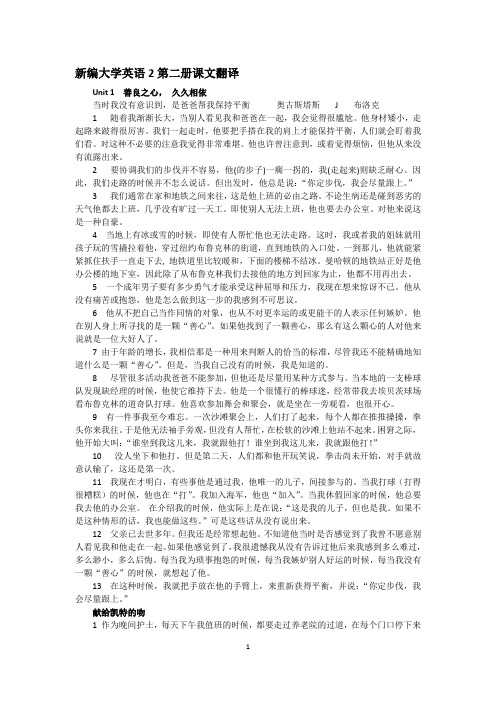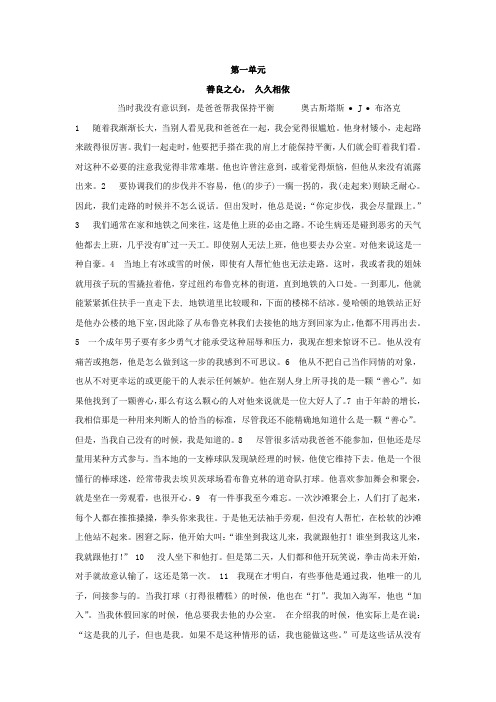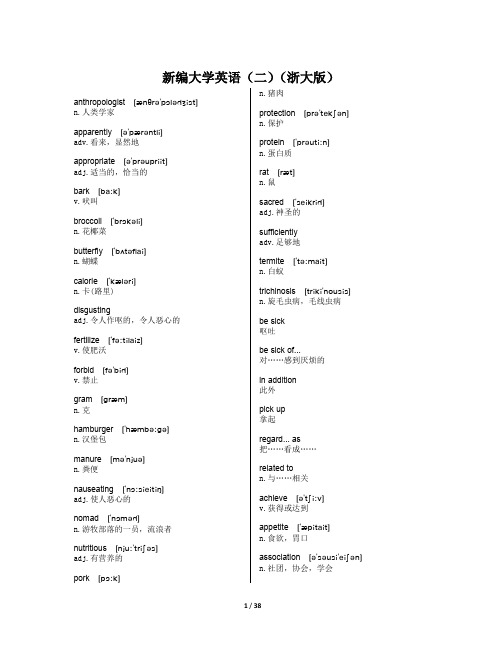新编大学英语(浙大版)第二单元2-2 课文
浙江大学《新编大学英语综合教程(2)》(第3版)(课文精解 Unit 2)【圣才出品】

二、课文精解Part1.Preparation1.The second student is supposed to translate it back into English and whisper it to the third student.短语be supposed to,其中to是动词不定式符号,不是介词,其后要跟动词原形。
当be supposed to的主语是“人”时,意为“应该,被期望”,它可以用来表示劝告、建议、义务、责任等,相当于情态动词should。
例:You were supposed to be here an hour ago.你应该在一小时之前赶到这里。
当be supposed to...的主语是“物”时,它表示“本应;本该”,用于表示“某事本应该发生而没有发生”。
例:This meeting,and the entire arrangement,are supposed to be confidential.这次会议,以及整个的安排应该都是保密的。
be supposed to后面接“have+过去分词”时,表示“本应该做某事而没做”。
例:Last summer,he was supposed to have been best man at his brother’s wedding.去年夏天他本该(本来应该)在他哥哥的婚礼上当伴郎.2.A city man had a new car and decided to try it out by driving in the country.try out试验,试用,尝试。
例:I wanted to try the boat out next weekend.我想下个周末去试一下这艘船。
Part2.Reading-Centered ActivitiesIn-Class Reading1.Everyone knew that people from Mars and people from Venus spoke different languages…此句中的people from Mars和people from Venus分别表示男人和女人。
浙江大学《新编大学英语综合教程(2)》(第3版)学习指南【词汇短语+课文精解+全文翻译+练习答案】

目 录Unit 1一、词汇短语二、课文精解三、全文翻译四、练习答案Unit 2一、词汇短语二、课文精解三、全文翻译四、练习答案Unit 3一、词汇短语二、课文精解三、全文翻译四、练习答案Unit 4一、词汇短语二、课文精解三、全文翻译四、练习答案Unit 5一、词汇短语二、课文精解三、全文翻译四、练习答案Unit 6一、词汇短语二、课文精解三、全文翻译四、练习答案Unit 7一、词汇短语二、课文精解三、全文翻译四、练习答案Unit 8一、词汇短语二、课文精解三、全文翻译四、练习答案Unit 9一、词汇短语二、课文精解三、全文翻译四、练习答案Unit 10一、词汇短语二、课文精解三、全文翻译四、练习答案Unit 1一、词汇短语Part 1. Preparationby its very nature就其本质而言unconditional [5QnkEn5diFEnEl] adj.无条件的,无限制的,绝对的【例句】The victorious army demanded unconditional surrender. 胜方要求敌人无条件投降。
【搭配】unconditional surrender 无条件投降live up to不辜负;做到;实践【例句】In some ways, we failed to live up to one another’s expectations. 在某些方面,我们互相的期望都落了空。
do one’s duty尽职责Part 2. Reading-Centered ActivitiesIn-Class Readingseverely [si5viEli] adv.严格地,激烈地【例句】Those responsible for this crime will be severely punished. 犯下这宗罪行的人将受到严厉惩罚。
severe [si5viE] adj.严厉的,严格的;剧烈的;严重的,严峻的【例句】He’s suffering from severe mental disorder. 他患有严重的精神病。
新编大学英语2第二册课文翻译

新编大学英语2第二册课文翻译Unit 1 善良之心,久久相依当时我没有意识到,是爸爸帮我保持平衡奥古斯塔斯 J 布洛克1 随着我渐渐长大,当别人看见我和爸爸在一起,我会觉得很尴尬。
他身材矮小,走起路来跛得很厉害。
我们一起走时,他要把手搭在我的肩上才能保持平衡,人们就会盯着我们看。
对这种不必要的注意我觉得非常难堪。
他也许曾注意到,或着觉得烦恼,但他从来没有流露出来。
2 要协调我们的步伐并不容易,他(的步子)一瘸一拐的,我(走起来)则缺乏耐心。
因此,我们走路的时候并不怎么说话。
但出发时,他总是说:“你定步伐,我会尽量跟上。
”3 我们通常在家和地铁之间来往,这是他上班的必由之路。
不论生病还是碰到恶劣的天气他都去上班,几乎没有旷过一天工。
即使别人无法上班,他也要去办公室。
对他来说这是一种自豪。
4 当地上有冰或雪的时候,即使有人帮忙他也无法走路。
这时,我或者我的姐妹就用孩子玩的雪撬拉着他,穿过纽约布鲁克林的街道,直到地铁的入口处。
一到那儿,他就能紧紧抓住扶手一直走下去, 地铁道里比较暖和,下面的楼梯不结冰。
曼哈顿的地铁站正好是他办公楼的地下室,因此除了从布鲁克林我们去接他的地方到回家为止,他都不用再出去。
5 一个成年男子要有多少勇气才能承受这种屈辱和压力,我现在想来惊讶不已。
他从没有痛苦或抱怨,他是怎么做到这一步的我感到不可思议。
6 他从不把自己当作同情的对象,也从不对更幸运的或更能干的人表示任何嫉妒。
他在别人身上所寻找的是一颗“善心”。
如果他找到了一颗善心,那么有这么颗心的人对他来说就是一位大好人了。
7 由于年龄的增长,我相信那是一种用来判断人的恰当的标准,尽管我还不能精确地知道什么是一颗“善心”。
但是,当我自己没有的时候,我是知道的。
8 尽管很多活动我爸爸不能参加,但他还是尽量用某种方式参与。
当本地的一支棒球队发现缺经理的时候,他使它维持下去。
他是一个很懂行的棒球迷,经常带我去埃贝茨球场看布鲁克林的道奇队打球。
新编大学英语第二册1-7单元课文翻译及课后答案

第一单元善良之心,久久相依当时我没有意识到,是爸爸帮我保持平衡奥古斯塔斯• J •布洛克1 随着我渐渐长大,当别人看见我和爸爸在一起,我会觉得很尴尬。
他身材矮小,走起路来跛得很厉害。
我们一起走时,他要把手搭在我的肩上才能保持平衡,人们就会盯着我们看。
对这种不必要的注意我觉得非常难堪。
他也许曾注意到,或着觉得烦恼,但他从来没有流露出来。
2 要协调我们的步伐并不容易,他(的步子)一瘸一拐的,我(走起来)则缺乏耐心。
因此,我们走路的时候并不怎么说话。
但出发时,他总是说:“你定步伐,我会尽量跟上。
”3 我们通常在家和地铁之间来往,这是他上班的必由之路。
不论生病还是碰到恶劣的天气他都去上班,几乎没有旷过一天工。
即使别人无法上班,他也要去办公室。
对他来说这是一种自豪。
4 当地上有冰或雪的时候,即使有人帮忙他也无法走路。
这时,我或者我的姐妹就用孩子玩的雪撬拉着他,穿过纽约布鲁克林的街道,直到地铁的入口处。
一到那儿,他就能紧紧抓住扶手一直走下去, 地铁道里比较暖和,下面的楼梯不结冰。
曼哈顿的地铁站正好是他办公楼的地下室,因此除了从布鲁克林我们去接他的地方到回家为止,他都不用再出去。
5 一个成年男子要有多少勇气才能承受这种屈辱和压力,我现在想来惊讶不已。
他从没有痛苦或抱怨,他是怎么做到这一步的我感到不可思议。
6 他从不把自己当作同情的对象,也从不对更幸运的或更能干的人表示任何嫉妒。
他在别人身上所寻找的是一颗“善心”。
如果他找到了一颗善心,那么有这么颗心的人对他来说就是一位大好人了。
7 由于年龄的增长,我相信那是一种用来判断人的恰当的标准,尽管我还不能精确地知道什么是一颗“善心”。
但是,当我自己没有的时候,我是知道的。
8 尽管很多活动我爸爸不能参加,但他还是尽量用某种方式参与。
当本地的一支棒球队发现缺经理的时候,他使它维持下去。
他是一个很懂行的棒球迷,经常带我去埃贝茨球场看布鲁克林的道奇队打球。
他喜欢参加舞会和聚会,就是坐在一旁观看,也很开心。
新编大学英语(浙大版)第二单元2-1 课文

Unit 2 Psychology in Our Daily LifeIn-Class ReadingIs There a Doctor in the Body?I. Word ListDirections: Memorize the words and phrases before class. You will benefit from your effort when you get the passage from your teacher and read it in class.Proper NamesRomanian. 罗马尼亚(欧洲巴尔干半岛东北部国家)New Wordsbleed*v. lose blood 出血e.g. He'd been wounded in the arm and he was bleeding heavily.bleedingadj. 出血的,流血的capsule *n. 胶囊harmless *adj. not having any bad effects, especially on people's healthe.g. The experiment was harmless to the animals.heal *v. make or become well again, especially after a cut or other injurye.g. It took three months for my arm to heal properly.likely *adj. expected to happen; probable 可能的e.g. I ) It's quite likely that we'll be in Spain this time next year.II) Once people have seen that something actually works, they are much more likely to accept change.placebon. (复-bos或-boes) 安慰剂prescribe *v. (of a doctor) say what (medical treatment) someone should have 为......开药方,嘱咐(疗法) e.g. What treatment did the doctor prescribe?prescription *n. 药方e.g. A doctor writes the prescription and a chemist (药剂师) makes it up for you.rate *n. a level of speed with which something happens or changes, or the number of times it happens or changes, within a particular period 率,比率e.g. birth rate, success rate, growth ratereact *v. behave differently or change as a result of something; respond 反应e.g. The judge reacted angrily to the suggestion that it hadn't been a fair trial.reaction *n. 反应e.g. What was her reaction when you told her the news?reality *n. 现实e.g. The reality is that they are poor.reassurance *n. help or advice that makes you feel less worried or frightened about a problem 安慰,保证e.g. Despite her father's reassurance she was still frightened of the dark.relationship *n. 关系e.g. This relationship between them seemed strange to him.relief *n. a feeling of comfort when something frightening, worrying, or painful has not happened or has ended (痛苦等)减轻,解除e.g. To our great relief, the children all arrived home safely.role *n. the way in which someone or something is involved in an activity or situation, and how much influence they have on it 角色,作用e.g. Until now scientists had very little clear evidence about the drug's role in preventing more serious effects of infection.seasickness *n. 晕船swear *v. (swore, sworn) say or promise very seriously or definitely 发誓,诅咒e.g. I don't know anything about what happened, I swear.treatment*n. a method that is intended to cure an injury or illness 治疗方法e.g. Heat treatment certainly helped my knee.tribal *adj. of a tribe or tribes 部落的e.g. tribal dress, tribal leadersulcern. 溃疡Is There a Doctor in the Body?1 When you go to the doctor, you like to come away with a prescription. It makes you feel better to know you will get some medicine. But the doctor knows that medicine is not always needed. Sometimes all a sick person needs is some reassurance that all will be well. In such cases the doctor may prescribe a placebo.2 A placebo is a sugar pill, a harmless shot, or an empty capsule. Even though they have no medicine in them, these things seem to make people well. The patient thinks it is medicine and begins to get better. How does this happen?3 The study of the placebo opens up new knowledge about the way the human body can heal itself. It is as if there was a doctor in each of us. The "doctor" will heal the body for us if we let it.4 But it is not yet known just how the placebo works to heal the body. Some people say it works because the human mind fools itself. These people say that if the mind is fooled into thinking it got medicine, then it will act as if it did, and the body will feel better.5 Other people say this is not so. They say that the placebo makes the wish to get better become reality. The placebo will not work if the patient knows it is a placebo. This shows that the body is not fooled by it. It seems that if patients think they have been given medicine, they will have hope. They feel that they are getting some help. This gives them a stronger will to get better, and that is what helps to heal them.6 Placebos do not always work. The success of this treatment seems to rest a lot with the relationship between the patient and the doctor. If the patient has a lot of trust in the doctor and if the doctor really wants to help the patient, then the placebo is more likely to work. So in a way, the doctor is the most powerful placebo of all.7 An example of the doctor's role in making the placebo work can be seen in this study. Some patients with bleeding ulcers were put in two groups. The first group were told by a doctor thatthey had been given a new drug which, it was hoped, would give them some relief. The second group were told by a nurse that they had been given a new drug but that not much was known about how it would work. As a result, 70 percent of the people in the first group got much better. Only 25 percent of the people in the second group got better. And both groups had in fact been given the same thing-a placebo.8 The placebo has been found to work with a lot of different cases. It helps such things as seasickness, coughs, colds, and even pain after an operation. And there was an experiment done to see if a placebo could help old people stay healthy and live longer.9 The test was done in Romania with 150 people over the age of 60. They were put in three groups with 50 people in each group. The first group were given nothing at all. The second group were given a placebo. The third group were given a real drug and told that it would help with the problems of old age. (In fact, it was not a drug for old age at all.) The three groups were studied for many years. The first group showed no changes from the way old people in that village had always been. The second group (with the placebo) had much better health and a lower death rate. The third group (with the real drug) showed much the same results as the group that took the placebo.10 A placebo can also have bad effects. If patients expect a bad reaction to medicine, then they will also show a bad reaction to the placebo. This would seem to show that a lot of how you react to medicine is in your mind rather than in your body. Some doctors still think that if the placebo can have bad effects it should never be used. They think there is still not enough known about it.11 And yet, the use of the placebo has been well known for hundreds of years in other countries. Tribal doctors in some African countries have known for a long time that patients will get better if they think they are going to. Many of the "treatments" they use do not seem able to make a sick person better, and yet such treatments work.12 The strange power of the placebo does seem to suggest that the human mind is stronger than we think it is. There are people who say you can heal your body by using your mind. And the interesting thing is that even people who swear this is not possible have been healed by a placebo. (839 words)Time taken: ____ minutesPhrases and Expressionsas a resultbecause of something that has happenede.g. He slipped and broke his leg. As a result, he will have to be away from school for two or three weeks.fool somebody into doing somethingtrick somebody into doing somethinge.g. Tim was fooled into believing that he'd won a lot of money.in a waypartly, to some degree 就某种意义来说,在某种程度上e.g. In a way, her health is much improved, but she is still not really well.open updevelop or make something available 展示,揭示e.g. This research opens up the possibility of being able to find a cure for the disease.react torespond to 对......做出反应e.g. Do children react to kind treatment by becoming more self-confident?rest withlie with 取决于,得靠e.g. Whether the talks are successful or not rests with a small number of men.。
新编大学英语2【浙大版】课文阅读b2u9_inclass_text

新编大学英语2【浙大版】课文阅读b2u9_inclass_textConsumer Behavior of the YouthDavid London and Albert D. Bitta[1]Marketers are interested in understanding what products will sell well in the youth market. It is also important to appreciate the influence that young people have on the purchases of others, such as parents. In fact, sometimes marketers are more interested in young people's influence on other buyers than in their role as the main purchasers of certain items.[2]How do youths spend their incomes? Both female and male teenagers spend most of their money on clothes, CDs, stereo equipment, entertainment, and travel. Young women spend most on cosmetics, followed by clothes and jewelry. Young men spend the most on sporting goods, cameras, CDs, stereo equipment, bicycles, shoes, jeans, musical instruments, and electronic games.[3]As a member of a highly consumption-oriented society, teenagers have become increasingly aware of new products and brands. They are natural “triers” and spend hours shopping for themselves.[4]In addition to their direct impact on the marketplace, youths have a secondary influence on many of the products and brands their parents choose. For example, research reveals that three out of four teens influence their parents' purchasingdecisions. For major purchases, teens' highest influence occurs in the first stage of the decision-making process and is strongest for aesthetic considerations such as style, color, and make of the product but weakest for decisions such as where and when to purchase and how much money to spend.[5] Apple computer's research showed that teens are influencing family decisions about buying computers. As a result, one of its recent model introductions used contemporary hit radio and computer magazines popular with young people to encourage teens to convince their parents to buy the new product.[6]With the large growth in the number of families of two working parents, youths are doing more of the food shopping and other shopping for parents. For example, one study found that 80 percent of teenagers were “heavily involved” in family food shopping.[7]Kraft recognized the importance of teenage grocery shopping and is advertising on MTV, in network agencies, in teen magazines, and on contemporary hit radio, emphasizing recipes containing Kraft products. Along with the ad campaign , Kraft also produced an educational kit on “Food Buymanship ” which is given to home-economics teachers to distribute to teenagers in school.[8]Thus, it is clear that this market also occupies an important position in terms of its secondary influence on parents' buying decisions.[9]Another factor emphasizing the market importance of the youth is that this is the time when brand loyalties may be formed that could last well into adulthood. For example, a brand-loyalty study done by Seventeen magazine found that at least 30 percent of adult women were using the same brands they first chose as teenagers. Translated into total market figures, the findings would mean, for instance, that 6,760,000 women still are using the same brand of cosmetics and 8,900,000 still are eating the same kind of packaged cheese that they first bought.[10]During the process of making their buying decision, to what extent are teens influenced by parents, friends, sales clerks, media, or other sources? For many product decisions, friends are the most significant influence. Nevertheless, parents are still an important factor affecting many buying decisions. The important point is that although peer pressure is quite strong, family influences are also significant. Thus, the marketer should know which group, parents or peers, has the most influence at any given time so they can plan their marketing strategies properly.[11]Teenagers often spend hours shopping, especially on weekends. The fact that they are doing more shopping may result in their spending more money in stores they go to. In addition, youths often have a great deal of authority in store-selection decisions, which means that stores must attract them with an effective appeal. Although the popular belief is that young people buy products impulsively and are less rational than the market as a whole, surveys indicate that most respondents aged 14 to 25 compare prices and brands before buying. Research onadolescent shopping behavior has produced the following tentative conclusions:[12] Adolescents tend to rely more on personal sources for information on sophisticated [N] products such as computers, and most on media for information on more ordinary products such as clothing or cosmetics.[13]At the product-evaluation stage of the decision process, price and brand name are perceived as the most important criteria, with a relatively low influence coming from parents and peers.[14]As teenagers mature, they use more sources of consumer information prior to decision making, rely more on friends and less on parents for information and advice in buying, and prefer to purchase products without parental supervision.。
浙江大学《新编大学英语综合教程(2)》(第3版)学习指南【词汇短语+课文精解+全文翻译+练习答案】

目 录Unit 1一、词汇短语二、课文精解三、全文翻译四、练习答案Unit 2一、词汇短语二、课文精解三、全文翻译四、练习答案Unit 3一、词汇短语二、课文精解三、全文翻译四、练习答案Unit 4一、词汇短语二、课文精解三、全文翻译四、练习答案Unit 5一、词汇短语二、课文精解三、全文翻译四、练习答案Unit 6一、词汇短语二、课文精解三、全文翻译四、练习答案Unit 7一、词汇短语二、课文精解三、全文翻译四、练习答案Unit 8一、词汇短语二、课文精解三、全文翻译四、练习答案Unit 9一、词汇短语二、课文精解三、全文翻译四、练习答案Unit 10一、词汇短语二、课文精解三、全文翻译四、练习答案Unit 1一、词汇短语Part 1. Preparationby its very nature就其本质而言unconditional [5QnkEn5diFEnEl] adj.无条件的,无限制的,绝对的【例句】The victorious army demanded unconditional surrender. 胜方要求敌人无条件投降。
【搭配】unconditional surrender 无条件投降live up to不辜负;做到;实践【例句】In some ways, we failed to live up to one another’s expectations. 在某些方面,我们互相的期望都落了空。
do one’s duty尽职责Part 2. Reading-Centered ActivitiesIn-Class Readingseverely [si5viEli] adv.严格地,激烈地【例句】Those responsible for this crime will be severely punished. 犯下这宗罪行的人将受到严厉惩罚。
severe [si5viE] adj.严厉的,严格的;剧烈的;严重的,严峻的【例句】He’s suffering from severe mental disorder. 他患有严重的精神病。
新编大学英语(二)(浙大版)

1 / 38
cafeteria ['k1fi'ti4ri4] n.自助餐馆
casual ['k19ju4l] adj.偶尔的,非正式的
chalkboard ['t53:kb3:d] n.黑板
commonly ['k3m4nli] adv.通常地,常常地
decline [di'klain] n.下降,减少
enthusiastically [in'7ju:zi'1stik4li] adv.满腔热情地
esteem [is'ti:m] n.尊重,看重
excessively adv.过多地
expectation ['ekspek'tei54n] n.期望
fulfilling adj.令人高兴的,令人满意的
hobby ['h3bi] n.业余爱好
dismissal [dis'mis4l] n.解雇,开除
divorce [di'v3:s] n.离婚
elect [i'lekt] v.选举
employer [im'pl3i4] n.雇用方,雇主
endure [in'dju4] v.持续,持久
frown [fraun] n.皱眉,蹙额,不悦
fur [f4:] n.(兔、猫等的)软毛,柔毛
reevaluate [`ri:i'v1ljueit] v.重新估计
rejection [ri'd9ek54n] n.拒绝,抛弃
slim [slim] adj.苗条的
spontaneously adv.自发地
statement ['steitm4nt] n.讲述的话
- 1、下载文档前请自行甄别文档内容的完整性,平台不提供额外的编辑、内容补充、找答案等附加服务。
- 2、"仅部分预览"的文档,不可在线预览部分如存在完整性等问题,可反馈申请退款(可完整预览的文档不适用该条件!)。
- 3、如文档侵犯您的权益,请联系客服反馈,我们会尽快为您处理(人工客服工作时间:9:00-18:30)。
Unit 2 Psychology in Our Daily LifeAfter-Class ReadingPASSAGE I The Psychology of MoneyNew Wordsaccount *n. 账户,户头e.g. I opened an account at my bank in your name.charge accounts赊欠户,赊欠帐actually *adv. in fact, really 实际上e.g. I didn't actually see her--I just heard her voice.addicted *adj. unable to stop doing or using something, especially something harmful 上瘾的,沉湎于......的e.g. She's become addicted to love stories.addictionn. 瘾,沉溺advertise *v. 为......做广告,宣传advertiser *n. 广告商alcohol *n. drinks that can make people drunk, such as beer, wine, and whisky 酒amount *n. a collection or mass (especially of something which cannot be counted) 数量,数额e.g. I still do a certain amount of work for them.assignment *n. task, homework 任务,作业e.g. The student's assignment was to write a book report.behavior *n. way of acting or functioning 行为e.g. Her behavior was in every way perfect.belief *n. the feeling of certainty that something exists or is true 信念,信赖e.g. He found it difficult to explain his beliefs.budget *n. 预算,收支预算e.g. My budget for this week included new shoes.cash *n. 现金claim *v. say, state or declare something as a fact (without being able to prove it) 声称e.g. The company claims that it is not responsible for the pollution in the river.compulsionn. urge that one cannot resist 欲望,冲动compulsiveadj. 上瘾的,嗜......成癖的compulsive spenders购物成癖的人compulsive bargain hunters购便宜货成癖的人credit*n. 赊欠,赊帐discipline *n. 克制,遵守纪律self-disciplinen. 自我约束,律已discount *n. a reduction in the cost of goods that you are buying 折扣enormous *adj. extremely large 巨大的e.g. These thoughts gave him enormous pleasure.hunt *v. search, try to find 搜寻,寻找huntern. 搜寻者huntingn. 搜寻influence *n. power to affect somebody's actions, character or beliefs 势力,影响e.g. Mr Jones is a man of influence in the town.instance *n. an example of something that happens generally 例子,事例e.g. There was something strange about each of the men; for instance, James could not speak.irrational *adj. not using reason or clear thinking 失去理性的e.g. Both your fears and your behavior are irrational.personality *n. characteristics and qualities of a person seen as a whole 个性e.g. She has a kind, friendly personality.psychologyn. the study of the mind and how it works 心理学psychological *adj. 心理学的,心理的psychologistn. 心理学家reflect *v. show, express, or be a sign of 反映e.g. The book reflected the author's own thoughts on the matter.salesclerk *n. shop assistant 售货员solve *v. find an answer to or a way of dealing with (a problem etc.) 解决e.g. Perhaps time would solve the problem.stem *v. originate, develop or grow (from) 起源于,由......造成e.g. All his problems stem from drink.symbol *n. a sign, shape or object which is used to represent something else 象征e.g. The heart shape is a symbol of love.therapistn. 治疗专家The Psychology of MoneyAre you a compulsive spender, or do you hold on to your money as long as possible? Are you a bargain hunter? Would you rather use charge accounts than pay cash? Your answers to these questions will reflect your personality. According to psychologists, our individual[1] money habits not only show our beliefs and values, but can also stem from past problems.Experts in psychology believe that for many people, money is an important symbol of strength and influence. Husbands who complain about their wives' spending habits may be afraid that they are losing power in their marriage. Wives, on the other hand, may waste huge amounts of money because they are angry at their husbands. In addition, many people consider money a symbol of love. They spend it on their family and friends to express love, or they buy themselves expensive presents because they need love.People can be addicted to different things—for example, alcohol, drugs, certain foods, or even television. People who have such an addiction are compulsive; that is, they have a very powerful psychological need that they feel they must satisfy. According to psychologists, many people are compulsive spenders; they feel that they must spend money. This compulsion, like most others, is irrational—impossible to explain reasonably. For compulsive spenders who buy on credit, charge accounts are even more exciting than money. In other words, compulsive spenders feel that with credit, they can do anything. Their pleasure in spending enormous amounts is actually greater than the pleasure that they get from the things they buy.There is even a special psychology of bargain hunting. To save money, of course, most people look for sales, low prices, and discounts. Compulsive bargain hunters, however, often buy things that they don't need just because they are cheap. They want to believe that they are helping their budgets, but they are really playing an exciting game: when they can buy something for less than other people, they feel that they are winning. Most people, experts claim, have two reasons for their behavior: a good reason for the things that they do and the real reason.It is not only scientists, of course, who understand the psychology of spending habits, but also business people. Stores, companies, and advertisers use psychology to increase business: they consider people's needs for love, power, or influence, their basic values, their beliefs andopinions, and so on in their advertising and sales methods.Psychologists often use a method called "behavior therapy"[2] to help individuals solve their personality problems. In the same way, they can help people who feel that they have problems with money: they give them "assignments". If a person buys something in every store that he enters, for instance, a therapist might teach him self-discipline in this way: on the first day of his therapy, he must go into a store, stay five minutes, and then leave. On the second day, he should stay for ten minutes and try something on. On the third day, he stays for fifteen minutes, asks the salesclerk a question, but does not buy anything. Soon he will learn that nothing bad will happen to him if he doesn't buy anything, and he can solve the problem of his compulsive buying. (542 words)Phrases and Expressionsbe addicted to somethingbe strongly interested in something as a habit or hobbye.g. The children are addicted to computer games.for instancefor examplee.g. There are jobs more dangerous than truck driving; for instance, training lions.hold on to somethingkeep something by not losing it or having it taken away from you 抓住......不放e.g. I think I'll hold on to the records, but you can have the tapes.in additionas an extra person, thing or circumstance 此外e.g. Hong Kong has some of the largest buses in the world. In addition, the city has underground trains and a rapid surface railway.on credit 以赊账的方式e.g. They decided to buy the car on credit.stem fromdevelop as a result of something else; arise frome.g. Her interest in flowers stems from her childhood in the country.PASSAGE II How to Jump Queue FuryProper NamesHouston(美国城市)休斯敦Massachusetts Institute of Technology(美国)麻省理工学院Richard Larson(男子名)理查德.拉森US National Science Foundation美国国家科学基金会New Wordsanalyse *v. study or examine something in detail in order to discover more about it 分析e.g. This book teaches you how to analyse what is causing the stress in your life.annoy *v. make somebody slightly angry and unhappy about something 使烦恼annoyancen. 恼怒aspect *n. a particular feature of, or way of thinking about, a complicated problem, situation, idea, plan, or activity 方面e.g. Have you thought about the problem from every aspect?authority *n. the group of people with official responsibilities for a particular area 官方,当局e.g. I'm going to report all these holes in the road to the authorities.automate *v. 使自动化automatedadj. 自动化的cite *v. mention something as proof for a theory or as a reason why something has happened 引用e.g. She cited three reasons why people get into debt.computerisedadj. equipped with computers to do the work for somebody 电脑化的directly *adv. 直接地e.g. The plane is due to fly directly back to London.dynamic*adj. energetic and forceful 有活力的e.g. Asia continues to be the most dynamic economic region in the world. 亚洲仍然是世界上经济发展最具活力的地区。
